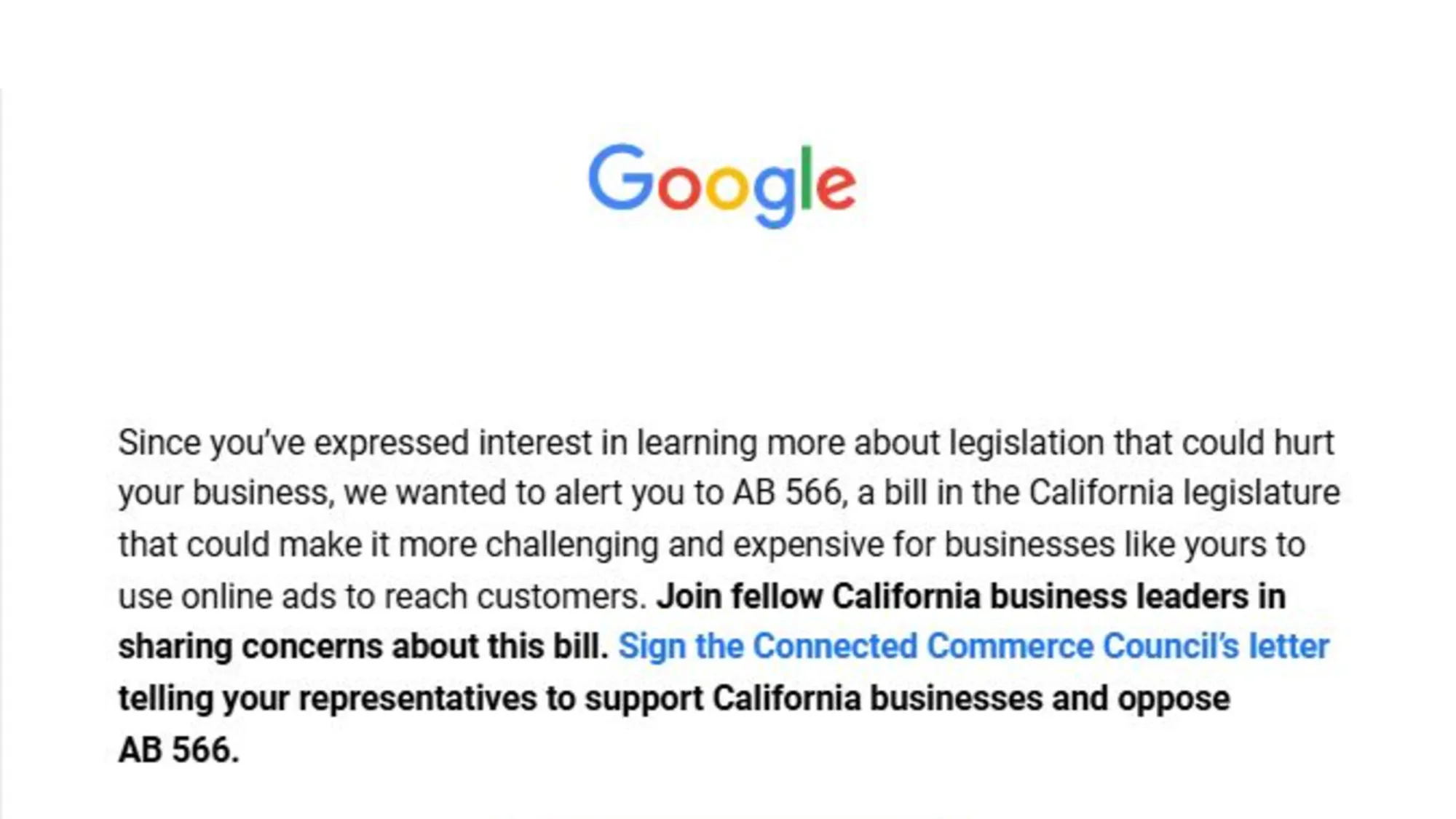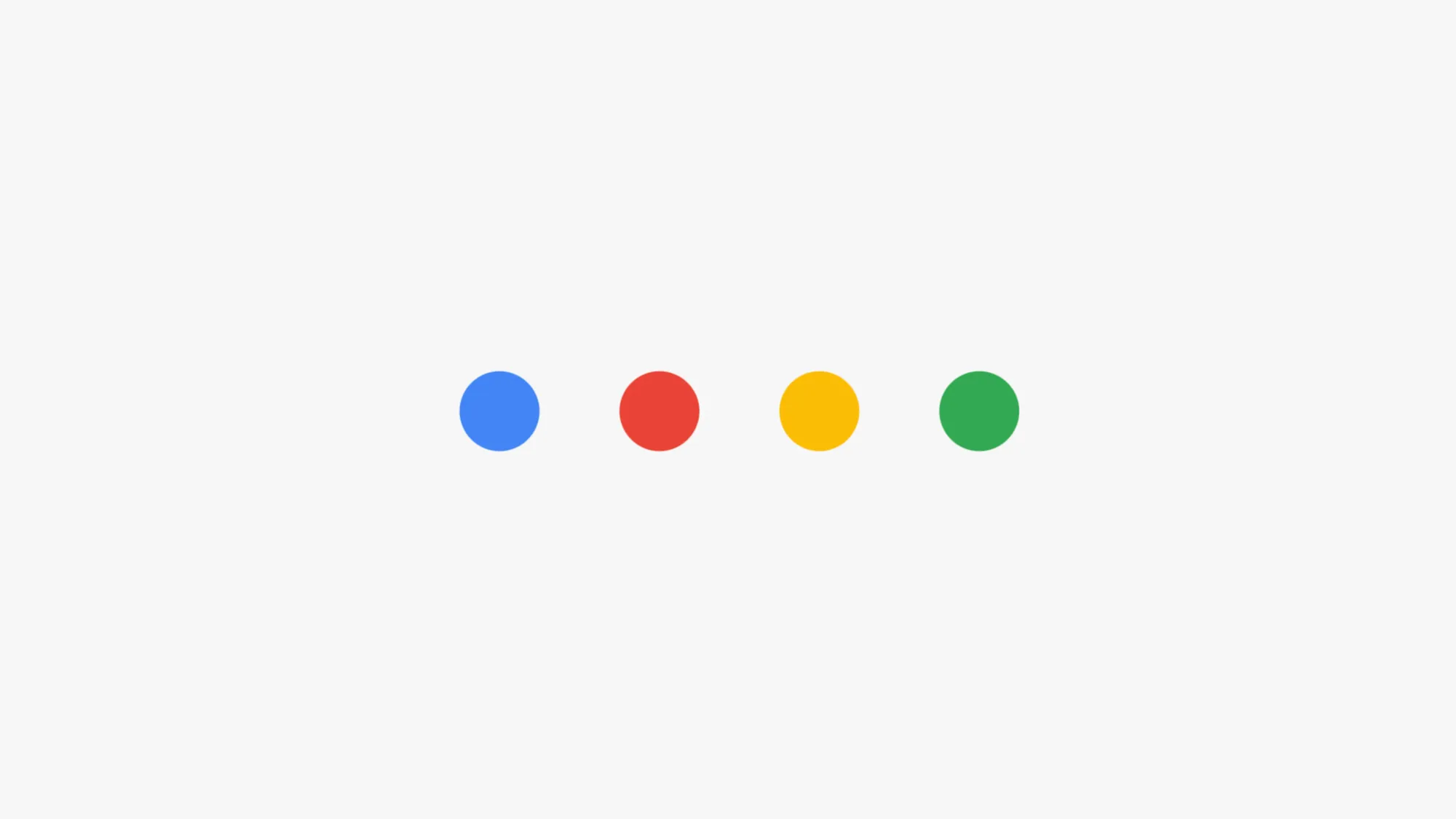Google's anti-privacy push sparks backlash among advertisers
Marketing professionals reject tech giant's campaign against California data protection bill.

Google is facing significant criticism after urging business owners to oppose a California privacy bill that would strengthen consumer control over data collection in digital advertising.
The controversy began when Google sent emails to small business owners encouraging them to sign a Connected Commerce Council letter opposing Assembly Bill 566 (AB 566). This outreach campaign, which took place less than three weeks ago on April 4, has prompted several prominent marketing professionals to publicly rebuke the tech giant's tactics on LinkedIn.
Navah Hopkins, Brand Evangelist at Optmyzr, immediately rejected Google's request in a detailed LinkedIn post. "Google just emailed me asking me to sign a petition to enshrine the assumption that marketers/ad platforms are entitled to user data," wrote Hopkins. "I will not sign and I encourage everyone to show support for AB 566."
Hopkins went further, articulating a philosophy that directly challenges Google's position: "If you can't build consent-driven conversations with your customers, then you haven't earned the right to annoy them with targeted ads."
What AB 566 actually proposes
At the center of this controversy is AB 566, legislation that would require web browsers and mobile operating systems to offer a built-in setting allowing users to easily opt out of data collection. Rather than navigating complex privacy settings across multiple platforms, consumers would have access to a single-step method to protect their privacy.
According to the Connected Commerce Council's letter opposing the bill, "California's privacy law already gives consumers broad opt-out rights. AB 566 would promote an untested technology for even wider opt-outs, and as a result, could cause consumers to inadvertently opt out without understanding how that might hurt their favorite local businesses."
The timing of Google's campaign is particularly noteworthy. Just three days ago, on April 11, Search Engine Land reported that the California legislature has advanced the bill despite opposition from major tech companies. This follows Governor Gavin Newsom's veto of similar legislation last year.
Want to reach marketing professionals and decision-makers? Showcase your brand, tools, or services with our sponsored content opportunities.
Marketing community responds
Hopkins wasn't the only marketing professional to express concerns about Google's approach. Julie Friedman Bacchini, Lead Generation PPC & SEM Specialist, stated: "Google is pretty notorious for astroturfing issues like this. I have long said that if you cannot get people to actively agree to what you might/want to do with their data then you should not be doing it."
Bacchini challenged the fundamental premise of Google's argument, explaining: "The argument that people don't object is not a fair one as most people have no idea that companies they buy from or provide information to might upload that information to an ad platform like Google Ads. If they did, most would say no thank you, just like they have with Apple's ATT prompts."
Louis Halton Davies, a Performance Marketing specialist for B2B, highlighted the imbalance in how data privacy impacts different stakeholders: "Another sad thing is that having consented data is incredibly valuable to Google and not having it is just annoying for SMBs. Appreciate Google is a commercial business but they really take the mick stacking the chips so far in their favor."
Google's claims examined
In its email campaign, Google made several assertions about AB 566 that marketers have questioned. The company claimed the bill would mandate "new and untested technology" that might confuse consumers. Furthermore, Google suggested the legislation would force businesses to "waste money showing ads to people who live far away or aren't in the market" for their products.
These claims have met with skepticism from marketing professionals. When examining Google's email closely, several issues become apparent. Most notably, as Hopkins pointed out in a follow-up comment, "The google form doesn't actually give you an option to write your own letter. You have to sign on to the letter pictured in the post."
This approach of offering a pre-written opposition letter with no customization options has further alienated some marketing professionals who believe the campaign lacks transparency.
Broader implications for digital marketing
This controversy illuminates the growing tension between major advertising platforms and privacy advocates. For the marketing community, the debate raises fundamental questions about the future of data collection practices and targeted advertising.
"We deserve the right to opt out of sharing our information and as marketers, we can absolutely 'make do' without perfect data," Hopkins argued, suggesting that the industry can adapt to greater privacy protections rather than fighting against them.
The timing of this dispute is particularly significant as digital marketing practices face increasing scrutiny worldwide. California has often led the way in establishing privacy regulations that eventually become industry standards across the United States.
Google's opposition to AB 566 stands in stark contrast to the approach of some marketing professionals who advocate for more transparent and consent-driven relationships with consumers. Rather than opposing privacy regulations outright, these professionals argue for adapting marketing strategies to work within an evolving regulatory landscape.
As Hopkins concluded in her LinkedIn post: "Really disappointed to see Google (or a Google alias) engaging in this kind of political misinformation."
Why this matters for marketers
The debate over AB 566 has significant implications for marketing professionals who rely on data-driven advertising strategies. If passed, the legislation would potentially reduce the volume of consumer data available to advertisers, requiring new approaches to targeting and measurement.
While Google argues this would harm businesses, particularly small and medium-sized enterprises with limited marketing budgets, some marketers counter that the industry has historically adapted to regulatory changes by developing more innovative and consent-focused approaches.
The controversy also highlights the growing divide between platform-centric and consumer-centric views of data privacy. As major tech companies increasingly face regulatory pressure worldwide, marketers must consider how to balance effective targeting with evolving consumer expectations around privacy and consent.
For businesses navigating this shifting landscape, the dispute offers a timely reminder of the importance of building direct relationships with customers rather than relying solely on third-party data. Those who develop consent-driven marketing approaches may ultimately be better positioned to thrive regardless of how regulations evolve.
Timeline of events
- Previous year: Governor Gavin Newsom vetoed similar legislation that would have strengthened consumer privacy protections.
- April 1-3, 2025: AB 566 introduced in the California legislature, proposing requirements for browsers and mobile operating systems to offer built-in opt-out settings.
- April 4, 2025: Google sends emails to small business owners urging them to oppose AB 566 through a Connected Commerce Council letter.
- April 7, 2025: Navah Hopkins posts on LinkedIn rejecting Google's request and encouraging support for AB 566.
- April 7-10, 2025: Multiple marketing professionals respond to Hopkins' post, expressing similar concerns about Google's tactics.
- April 11, 2025: Search Engine Land reports that California legislature has advanced AB 566 despite opposition.
- April 14, 2025: Debate continues within the marketing community about implications of the proposed legislation.


